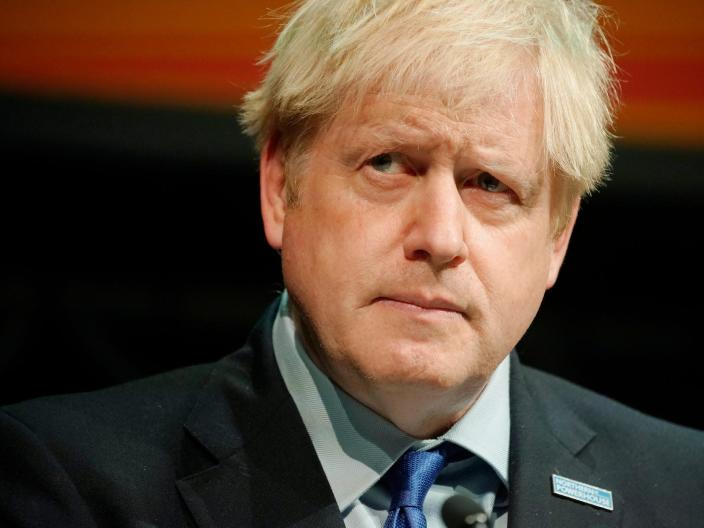
-
Boris Johnson’s plan to “fix” the Northern Ireland Protocol was met with EU threats of legal action.
-
The US did not pass judgment but called on Liz Truss to hold “good faith” talks with the EU.
-
Back in the UK, the pro-Brexit ERG has withheld support until it further assesses the measure.
Boris Johnson’s plan to amend the Northern Ireland Protocol was met with threats of legal action from the EU, a warning from the US to engage in “good faith” talks — and a muted reception even from pro-Brexit MPs.
On Monday, Foreign Secretary Liz Truss unveiled the Northern Ireland Protocol Bill, describing it as “a reasonable, practical solution to the problems facing Northern Ireland”.
A government press release said the measure would “fix” the protocol, which the UK agreed alongside the EU when it left the bloc.
Truss told MPs: “It will safeguard the EU single market and ensure there is no hard border on the island of Ireland. We are ready to deliver this through talks with the EU. But we can only make progress through negotiations if the EU are willing to change the protocol itself — at the moment they aren’t.”
Speaking earlier the same day, Johnson insisted the proposals were “not a big deal,” telling broadcasters that legislation was a way to remove “bureaucratic barriers” hindering trade from Britain to Northern Ireland.
As well as creating a “red lane” for goods destined for the EU and a “green lane” for those remaining in Northern Ireland, the bill would end the jurisdiction of the European Court of Justice on trade disputes. Both of these have been key demands unionist in Northern Ireland, led by the DUP.
But the move has been met with widespread opposition, most significantly from officials in Brussels, who are now considering three different types of legal action.
Maros Sefcovic, the vice president of the European Commission and Brussels’ chief negotiator, said the UK’s move was of “significant concern”, and that the UK’s “unilateral action is damaging to mutual trust.”
He said the commission would consider restarting an “infringement procedure” that had been on hold since September, and would take unspecified new action “protect the EU Single Market from the risks that the violation of the Protocol creates”.
Sefcovic warned that if the UK pushed ahead with the legislation, it would undermine “the trust that is necessary for bilateral EU-UK cooperation within the framework of the Trade and Cooperation Agreement” — a veiled threat signalling a potential trade war.
The UK plan was also criticized by Sinn Féin deputy leader Michelle O’Neill as “absolutely reckless”.
Speaking to the BBC, Northern Irish trade associations also warned about the potential impact it may have on businesses in the region.
The US held back from picking a side in the dispute, though Secretary of State Antony Blinken on Monday urged told Truss “to continue good faith negotiations with the EU to reach a solution that preserves the gains of the Belfast/Good Friday Agreement,” according to a State Department readout.
Back in Britain, the move did not receive initial backing from the most hardline Brexiteer MPs.
The ERG is reconvening its “Star Chamber” to assess the bill line by line, the Telegraph’s Chris Hope reported in his newsletter yesterday.
Earlier in the day Lord Frost, the former Brexit negotiator and minister, also withheld his support, saying: “The Govt is right to act but must get the detail right.”
After 148 of Johnson’s own MPs voted against him last week in a confidence vote, rebel MPs, who were granted anonymity to speak frankly, told Insider they plan to repeatedly block legislation, hoping it will force him from office.
One likened it to the period of paralysis under Theresa May, though Johnson has a far large majority in parliament that would make it easier for him to continue passing legislation.
That opposition was not universal, however, with one pro-Brexit rebel telling Insider they would be “supporting [the bill] in any case”.
Suella Braverman, the attorney general who has given the Northern Ireland protocol legislation her legal backing, recently told Johnson to sack disloyal MPs from the party, according to Insider’s sources.
Several MPs have both publicly and privately already suggested they will vote against any change to the protocol.
Read the original article on Business Insider




